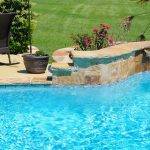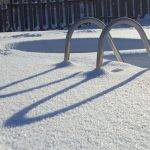You’re standing there looking at your clear water. You want so badly to get in, but only your toes can stand the cold water temperature. Then and there you decide a pool heater is a must. Pool heaters are a great investment as it allows the user to bring the water to a comfortable temperature for the user. In this article we hope to describe three of the most commonly found types of pool heaters a user can purchase.
Gas Heaters
Gas heaters are the most commonly found heater sold for pool owners. Heaters use either propane or natural gas to create a fire in the heater. Heat is transferred to the water as it passes through the heat coils on it’s way to the pool. A major benefit of gas heaters is their ability to heat the water regardless of the external temperature. In general you should buy the largest BTU heater you can afford. You only use the BTUs you require to raise the water to the selected temperature. A small heater may take a long time to give you the BTUs required, while a large heater will generate the same BTUs quickly. A user should make sure their gas meter and plumbing can deliver the amount of gas needed to run the heater. A simple calculation for a user to calculate the minimum size of gas heater one should buy is as follows, 1 BTU raises 1 lb of water 1 degree. If a user wishes to rapidly raise their water temperature then a large heater is needed. If they wish to only maintain a temperature then they can get away with purchasing a slightly smaller heater.
Heat Pumps
Heat Pumps are a very efficient method of heating a pool using only electricity. These heaters tend to take awhile to heat the water when compared to a Gas Heater, however they do an amazing job maintaining the water once it reaches the desired temperature. These heaters tend to be a higher up front cost when purchasing however they tend to cost less to run each month due to their efficiency. Just like a gas heater users should purchase the largest heat pump they can. To determine the minimum size heat pump to purchase the user first should know the temperature of the water they wish to maintain and the average outside temperature at their house. The Department of Energy the suggests using the following formula to determine the minimum size heater to purchase,
Pool Area x Temperature Rise x 12
Some Heat Pumps also double as chillers that are capable of also cooling the water if the user wishes. This can be beneficial in very hot areas where water temperatures can reach mid-90’s without the use of any hearers.
Solar Heating
Solar heating works by running water through small pipes in the panels that is warmed by the sun. One minor issue with solar heating is that because the sun is the heat source they do not work during the night. Users who wish to install solar panels on their roofs needs to make sure their pump is able to provide enough flow to push the water through the plumbing. While solar heating can be the most expensive to install they are the cheapest to run as the heat source is free. They also tend to last the longest out of the three heaters as there are no moving parts to break down in time.
Regardless of the type of heaters a user wishes to purchase there are a few items all should think about. The best suggestion TFP can make is to use a solar cover while the pool is not in use as it will greatly reduce the cost to heat the water. Another benefit of a cover is that the user will tend to see lower chemical usage and less water evaporation during the day. For a further discussion on solar covers please visit this post. Lastly users should pay special attention to their water chemistry, especially their pH levels, as low pH can ruin a heater rather quickly.





